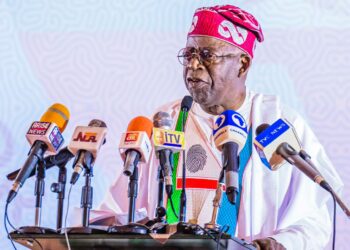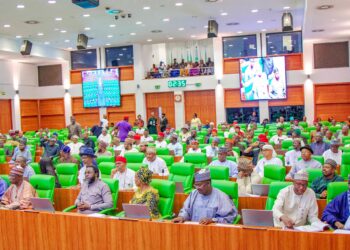KPMG has revealed 7 fault lines that may distort the growth of the Nigerian economy over the new decade. The multinational professional services firm disclosed these at the Nigerian-South Africa Chamber of commerce council’s breakfast forum in Lagos.
Speaking at the forum, the Associate Director, Strategy and Economics, Management Consulting, KPMG Nigeria, Olusegun Zaccheaus, explained that the Nigerian economy failed to record any strong meaningful growth in the just-concluded decade due to several structural issues.

According to KPMG, there are 7 major fault lines that may distort Nigeria’s economic landscape in the next decade, and these include external dependence, fiscal unsustainability, unorthodox monetary policy strategy, VUCA policy environment, low productivity, low consumption power and social-economic weak link.
The major fault-lines for the next decade
- External Dependence
According to the firm, Nigeria depends on external sources for fiscal revenue, FX inflows, deficit funding and capital flows.
Specifically, KMPG emphasized that there is an overreliance of the Nigerian economy on external borrowing, oil price and foreign capital flows. Hence, any commodity shock that comes from the global economy will have severe implications on the Nigerian economy.
[READ MORE: Nigeria’s economy can’t survive without diaspora inputs, says PwC Chief Economist)
- Fiscal Unsustainability
While providing further insights on the economy, KPMG revealed that Nigeria’s debt profile has grown significantly above the revenue. According to the firm, Nigeria’s debt portfolio has grown remarkably, compared to the fluctuating trend witnessed in revenue influx in the past years.
KPMG noted that with the overly ambitious revenue target in the 2020 budget, the country’s debt stock is expected to hit a new high, further dragging the country into lingering debt problem.
It was disclosed that while debt has increased significantly in the Sub-Saharan region, with Euro bond wholesomely driving this, Nigeria is a leading contributor. Meanwhile, the firm noted that indeed, Nigeria may not have a debt problem but revenue. According to KPMG, Nigeria has one of the lowest Debt-GDP ratios in Africa, however, the country records one of the lowest revenues to GDP among Africa’s largest economies.
READ MORE: Non-oil sector to contribute 80% of Nigeria’s revenue in 3 years – FIRS
- Unorthodox monetary policy strategy
Analysing Nigeria’s monetary policy environments, KPMG stated that the CBN has achieved some level of progress from its policies, and these include stabilizing FX market, improving liquidity and improved foreign portfolio investment.
According to KPMG, exchange rate has been stable since 2017, and this is traceable to the Central Bank strategy to defend the naira at the expense of the country’s reserves. KPMG disclosed that CBN intervened in the FX market in 2019 by injecting $39 billion into various windows to keep the naira stable at the prevailing market rates.
Despite this, key underlying issues still exit. Some of the issues highlighted by KPMG include FX supply gap, continued depletion in external reserves, expensive OMO instrument and overvaluation of naira.
On the issue of increase in Loan-to-deposit ratio to 65%, KPMG noted that the policy initiative indeed raised credit to the private sector by N2 trillion at the end of 2019, but Nigeria still ranks the bottom of credit pyramid when compared to countries like China, India, Brazil, Indonesia and South Africa.
- VUCA policy environment
While putting the country’s policy environment in perspective, KPMG described it as volatile, uncertain, complex and ambiguous. On the volatile nature of the economy, KPMG stated that the speed of change which drives fluctuations in the global market directly triggers oil prices, aggregate demand and inflation respectively in the Nigerian economy.
Analyzing the uncertain landscape of the economy, the firm stated that the uncertainty which surrounds the Nigerian economy limits decision-making capabilities. Some examples listed include the sudden border closure, ban of Okada in some states, and so on.
READ MORE: Nigeria’s 3.46 trillion fiscal deficit, a source of concern – MPC Member
On the other hand, the complex environment reflects in multiple taxation, stamp duty, increase in electricity tariffs and so on. While the ambiguous landscape is characterized by the exchange rate systems which has made the economy unattractive for foreign direct investment.
- Low Productivity
On the low level of productivity, KPMG revealed that low productivity is a critical problem limiting economic potential of individuals and firms in Nigeria. The firm disclosed that Nigeria’s productivity level has been trending below the country’s GDP, as labour productivity continues to slope to the negative region.
According to KPMG, major productivity issues affecting corporates include poor infrastructure, power supply, opportunity cost of port congestion and poor regulatory interventions. Although, KPMG noted that the country recorded some progress through improvement in the ease of business ranking and reduction in tax burden on SMEs.
- Low Consumption Power
According to KPMG, Nigeria has been faced with declining GDP per capita since the aftermath of recession in 2016, and the trend may be exacerbated by the recent policy move by the government to raise VAT from 5% to 7.5%.
For individuals, the firm disclosed that limited income growth, increased taxes, electricity tariff hike, inflation and high unemployment are key issues that pitched against consumers.
- Social-Economic weak link
Lastly, KPMG stated that the social wheel of pressure is spinning, as 31% of the youth-led labour force is unemployed, meaning the key engine for Nigeria’s growth remains grossly underutilized.
The firm noted that corruption remains endemic, healthcare sector at the low ebb, out of school children remain high amidst insecurity, mortality rate concern and migration. According to KPMG, the rising social wheel of pressure is expected to see more skilled youths migrate to other countries of the world.
[READ ALSO: KPMG lists trends that will determine Nigerian economy in 2020)
How Corporates can survive
While concluding, KPMG stated that for corporates to guide against the fault lines in Nigeria, there must be headroom for shocks. According to KPMG, creating headroom for shocks as a corporate will largely create a buffer for a firm to escape the negative effects of the fault lines.
Other strategies listed for corporates include hedging, strategic agility, regulatory compliance, creating alternative scenarios, investing for upsides and achieving minimum scale for survival in the industry.






















